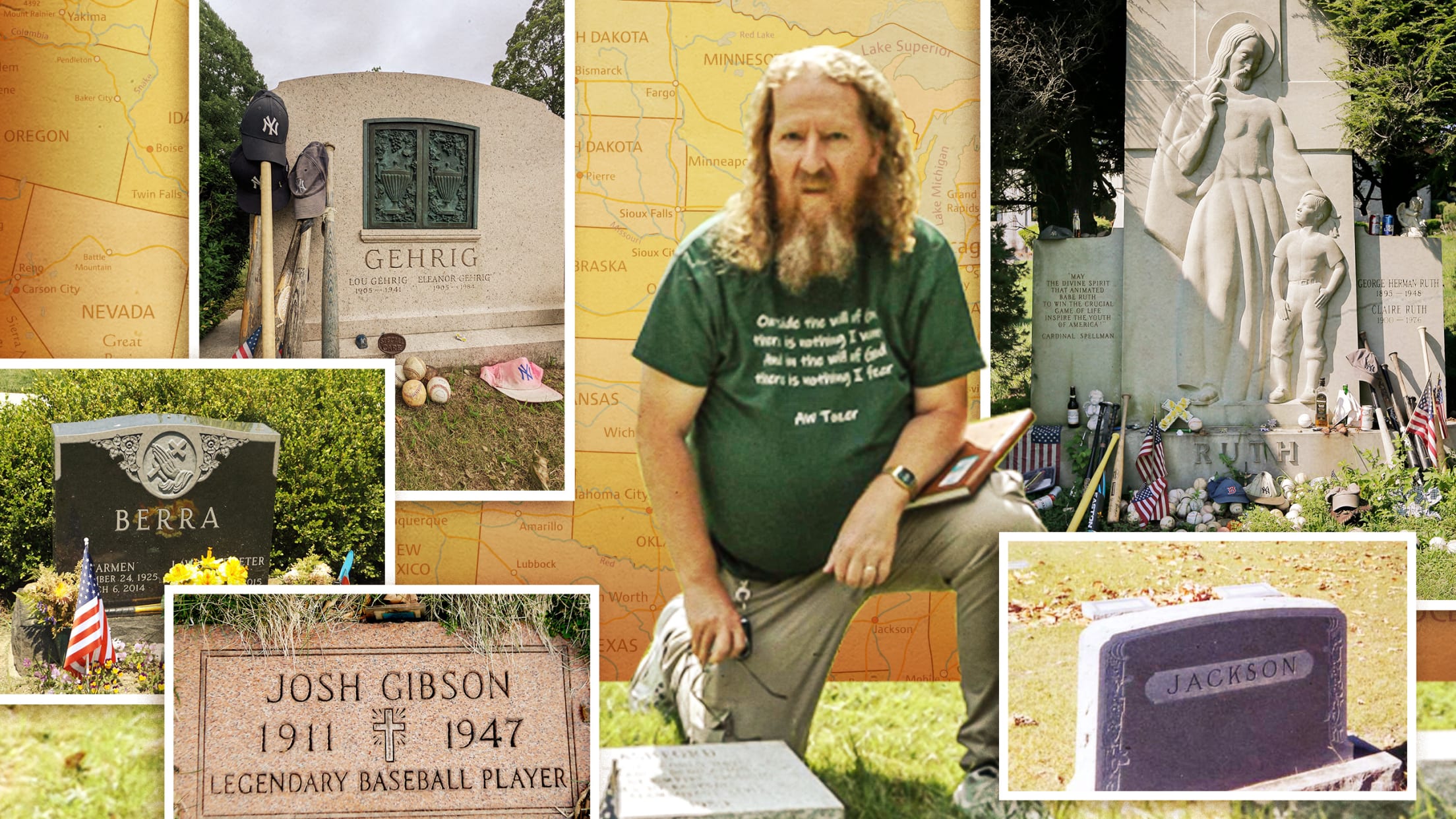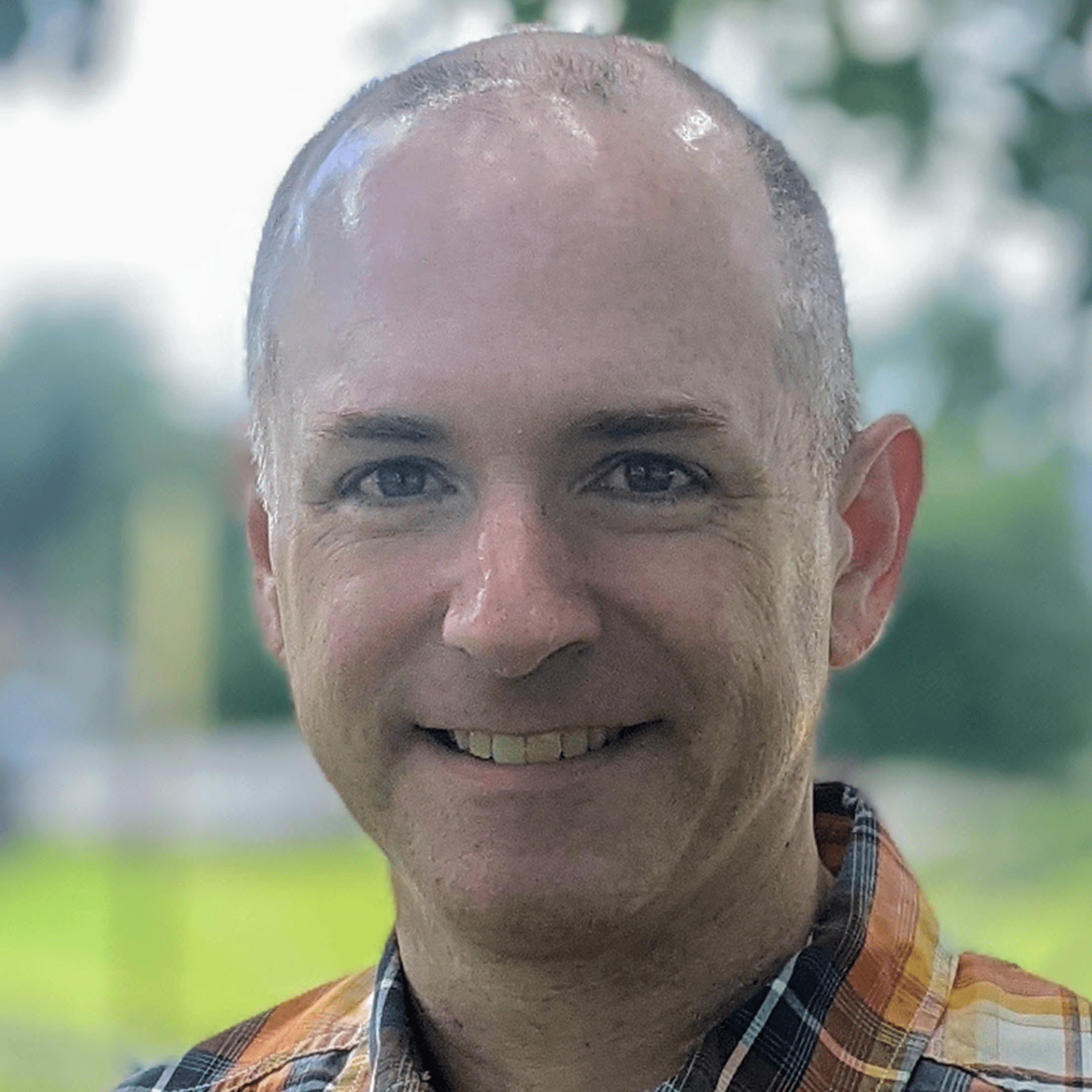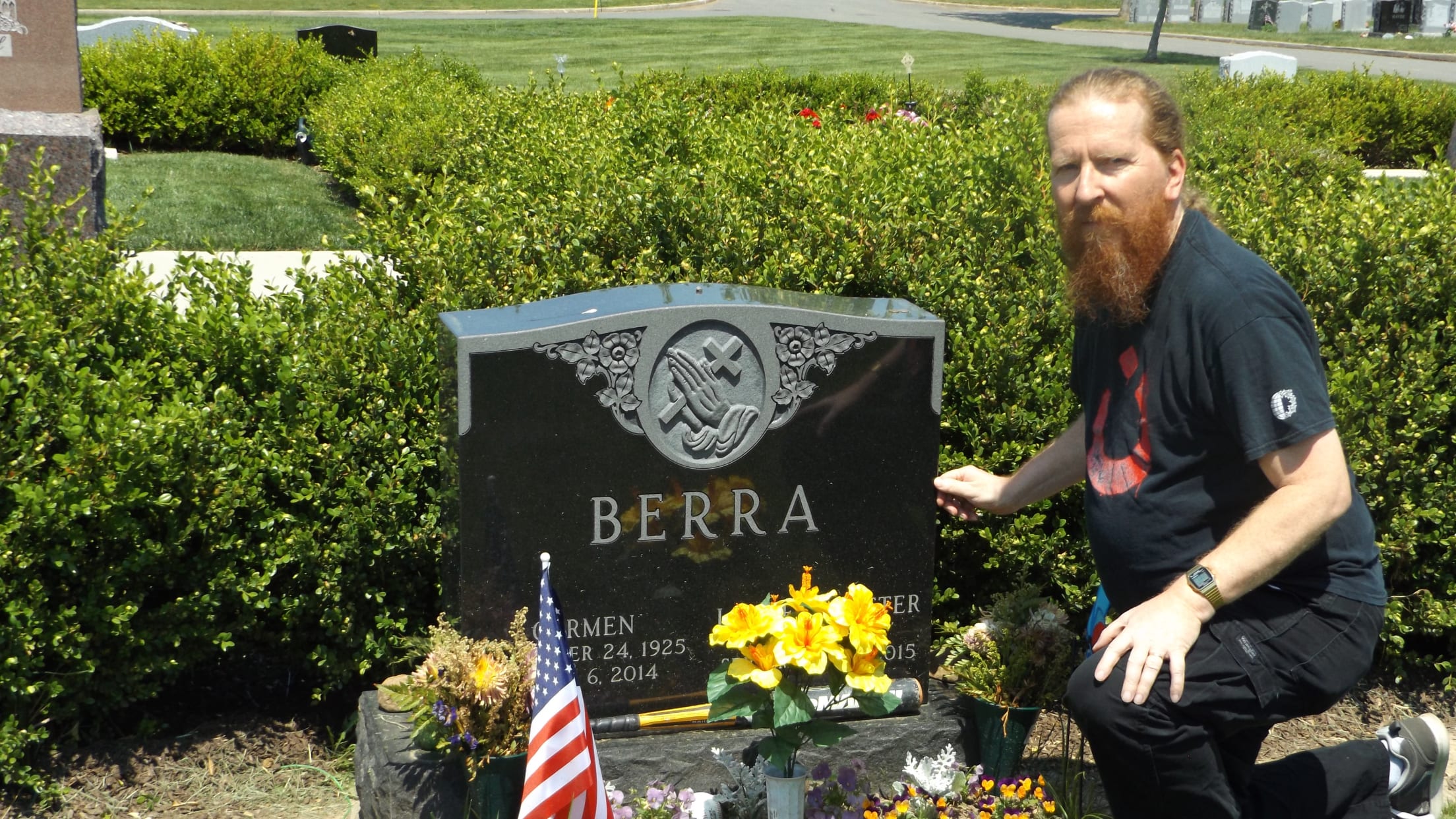
That's one way to remember some guys: Fred Worth has visited 10,146 baseball graves

On a bright June morning in Cooperstown, N.Y., Dr. Fred Worth pulled into Lakewood Cemetery on the eastern shore of Otsego Lake. He stepped out of his 2024 Buick Encore – a new car that, in less than a year, has already ticked past 44,000 miles – and walked up to a cluster of headstones with the name Wilshere.
Worth has no connection to Vernon “Whitey” Wilshere, and he only knows that he pitched for Connie Mack’s Philadelphia A’s in the 1930s (just 41 games from 1934-36, it turns out, but he did lead the American League with 10 batters hit by pitch in ’35). That Wilshere played baseball professionally is what matters.
Notebook in hand, Worth took a few pictures with the digital camera hanging from his neck and then turned to his right. A little more than 60 feet away lie two more grave markers in a plot owned by the Hall of Fame. One marks the final resting place of Ken Smith, a former sportswriter and director of the Hall. The other is for Emmett Ashford, the first Black umpire in the American League. These were the 9,998th, 9,999th and 10,000th – that would be Ashford, by design – baseball graves that Worth has visited over the past 20 years.
A professor of mathematics at Oklahoma Wesleyan University, Worth uses breaks in the academic calendar to spend weeks criss-crossing the country to seek out the final resting places of just about anyone connected to baseball: ballplayers, managers, coaches, executives, umpires, scouts, writers, broadcasters. He’s chatted up locals to find small family graveyards tucked into the trees off dirt roads, been led by guards onto the grounds of state mental hospitals to find their burial grounds, had police escorts to access locked gates at cemeteries in high-crime neighborhoods. If someone’s been cremated and Worth knows where the ashes were scattered, he’ll go there, too. He’s even paid the fare to take ferries to Martha’s Vineyard and Nantucket, just to visit the one ballplayer laid to rest on each island.
It’s a pastime that started, how else? By poking around on the internet. At the time, Worth was teaching in Arkansas – where he was also an associate pastor at a church for 20 years – and he learned about a grave that was not that far away, in the southwest corner of the state.
“Back in 2004, I think I was having a stressful semester and I happened upon Frank Russo’s website, thedeadballera.com,” Worth, 66, said when we met at his New Jersey hotel one afternoon at the start of his most recent trip. “[The site] is not connected to 1901 to 1919 baseball, it’s connected to dead baseball players. And I found it amusing. I saw there’s a Hall of Famer, Travis Jackson, buried about an hour from where we lived. So I asked my wife, ‘Hey, you want to drive down to Waldo, Arkansas?’ – that’s the actual place where he is, which leads to the obvious ‘Where’s Waldo’ jokes – and real naively, I just went to the cemetery and started walking around looking. And of course it was a small cemetery, so we found it.”
Jackson was the leadoff hitter to an endeavor that has encompassed almost one-third of Worth’s life. He’s on his third vehicle now, having watched the odometers of two Chevy Malibus pass 250,000 miles. No, not all of that is from trips to baseball gravesites – but when he lived in Arkansas, he could walk to work.
“Then I found out that Schoolboy Rowe was in El Dorado, Arkansas,” he said, pausing to emphasize in his slight southern twang – despite his New Jersey roots – that it’s pronounced El Dor-ray-do. “That was where I started realizing just showing up at a cemetery and walking around looking is not a good idea. Small cemeteries, that works. Spring Grove Cemetery in Cincinnati, which is 700 acres – that doesn’t work. Especially when some of the graves are unmarked.
“But I found Travis Jackson without any trouble, found a few others, then I found out about some more, and I found out about some more ...”
Worth’s searching has taken him to every state in the Lower 48. After his four-week jaunt around the Northeast this summer, he’s now up to 10,146 gravesites in 4,462 cemeteries in 3,045 cities. He’s visited 7,603 former Major League players (not counting 730 Negro Leaguers, some of whom played in the era that is now officially considered Major League); 974 Minor Leaguers; 323 umpires; 152 executives; and dozens of others, including Jack Norworth and Albert Von Tilzer, who wrote “Take Me Out to the Ballgame,” and William Sianis, the tavern owner who was denied entry to a World Series game at Wrigley Field in 1945 because he refused to leave his pet goat outside.
The GPS has tried to kill us a couple times. In West Virginia, it told us to turn right to cross the river. Well, I'd like to try to do that where there's a bridge. The bridge used to be there. I went up to where the new bridge was, and that's where the GPS showed us driving across water. Jesus walked on water, I drive on it.
Dr. Fred Worth
But it’s not just granite markers in the grass that Worth is chasing. Those 10,146 locations represent 10,146 lives and the stories of 10,146 people.
“We were in a small town in Arkansas one time looking for a Minor Leaguer,” Worth recalled. “It was Saturday at five o’clock, nobody was there [at the funeral home, which had the burial records]. Well, just as we’re getting ready to go, we heard a noise. It’s an old guy, and he invited us in and we told him who we were looking for, this guy who played Minor League ball and then became a pastor. And he said, ‘Oh. He baptized me when I was a kid.’ These are real people with real lives. They’re not just these heroes that we see – they’re real people with real life stories.”
Worth’s wife, Beth, has joined him on just about every one of these trips, even though she’s used a wheelchair since a stroke 10 years ago.
“One time, we were coming back from one of these trips,” Worth said. “Before the stroke, I knew she enjoyed them. Afterwards, I wasn’t quite as sure. And we were talking to a friend on the phone in the car, and it was on speaker. And so I heard the friend ask, ‘So Beth, are you enjoying yourself?’ And she said, ‘Yes.’”
With that, Worth let out an exaggerated sigh of relief and smiled.
“It’s fun. We get to see the country and they’re not all on the interstates. I mean, some of them are absolutely nowhere near the interstates.”

Take George Shears, who pitched 15 innings in four games for the 1912 Yankees.
“That one is actually on a ranch run by a cult. A weird religious cult -- I mean, really weird,” Worth said. “And, we had to go there and meet the head guy, which was a little bit creepy. But he took us down to where we needed to go, said, ‘That’s where the grave is, the cemetery is up there. Now when you get to those wires, be careful, that’s electrified: cattle fence.’ But it was such that we could step over it. As long as you step over carefully, it’s not going to kill you. It’s gonna make you uncomfortable, depending on what body part it hits. But yeah, that that was a weird one.”
Worth has never let something get in the way of his passion, whether it’s a cattle fence or long division.
“I’ve been a baseball nerd since I was a kid,” he said. “I’ve been a Mets fan since 1964. In first grade, I came home, I was real upset because they hadn’t taught us how to do long division. They didn’t do that until fourth grade. But I had found out that if I could do long division, I could do batting averages. And I wanted to be able to do batting averages. So my mother taught me how to do long division when I was in first grade, so I could do batting averages. I’ve been a math and baseball nerd ever since.”
That early ambition led to a PhD in mathematics and now a hobby that he documents meticulously. He maintains an extensive spreadsheet, and when he moved from Arkansas to Oklahoma, he packed up 135 three-inch three-ring binders with all the pictures he’s taken at gravesites. (He said of the movers, “By the time they were getting ready to finish loading the truck, I heard one say, ‘Ugh. More books.’”) He’s also recorded the GPS coordinates for every grave and shared all that data with the Society for American Baseball Research. It led to the SABR Baseball Graves Map, which plots all the gravesites and allows users to get turn-by-turn directions from Babe Ruth to Lou Gehrig, or anyone else they care to visit.
“One of the things that impressed me the most about his passion is that he enjoys going to see people with a game, three games, somebody that just kind of had that brief cup of coffee in the Major Leagues,” said John Racanelli, co-chair of SABR’s Landmarks Committee, which maintains the Graves Map, as well as the group’s initial project, the Landmarks Map. “He’s told the story of Bob Mavis from the Tigers, who literally his only Major League appearance was as a pinch runner. He went in, he pinch-ran, he jogged down to second on a walk, and then it was over. And [Fred’s] like, ‘You know, his entire Major league career consisted of jogging 90 feet,’ and I think that’s amazing to [honor] that.”
For grave No. 10,000, Worth was joined by a friend from Arkansas, Kelly Cannon, who wanted to be there to document the occasion. (Cannon graciously shared the video he put together with MLB.com.) The two met nearly 25 years ago when Cannon was a student at Henderson State University, where Worth taught until last year.
“The work he’s doing is going to echo throughout baseball history. I mean, it really is,” Cannon said. “I think it’s one of the most amazing things in sports that anyone could ever partake in and dedicate themselves to. And, aside from the sporting aspect of it, he runs into graves from famous people from all walks of life. And if it’s somebody that he knows, he’ll go out of his way to document that. I’m friends with him on Facebook, and he will tag people when he’s out visiting graves. He’ll say, ‘I passed by so-and-so today,’ and somewhere in the comment section, you’ll see somebody thanking him for it, and then talking about who that person was to them. I think it’s pretty awesome.”
These visits to other famous graves and those related to friends aren’t accidental, either. Worth’s expeditions are so prolific and successful because of the preparation he does before getting into the car.
“I do a lot of research ahead of time. I’ve got a stack of papers literally this thick for this trip,” he said, holding his fingers an inch or so apart. “In 2021, we were on the road for nine weeks, drove 17,000 miles, found 1,157 graves, mostly in Ohio and Michigan. I spend a lot of time on Find a Grave and other online resources. Then I call cemeteries to get information. Some are really, really helpful – like Calvary in St. Louis, that woman was awesome. Then some, they’re not the least bit helpful. Some, they can’t help: All the records were destroyed in a fire in 1915. One in Georgia, they’d been renovating city hall and some guy threw away a box without checking to see what it was. And so they have no cemetery records prior to 1980, because some idiot just threw out a box.”
Because death is a part of life, Worth will never be able to visit every baseball grave, but there are still pockets of the country he has yet to cover, still stories to discover. He’s already planning trips over Thanksgiving (Texas), spring break (Pennsylvania) and for next summer (the Pacific Northwest). And as new burials take place or previously unknown locations become known, he’ll double back to areas already covered.
“I don’t know how many total miles [I’ve driven],” he said. “It’s probably 200,000 miles, but that’s just a pure guess. I don’t want to think about how much money I’ve spent doing it, but it’s fun.”